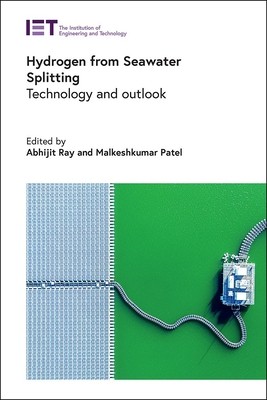
- We will send in 10–14 business days.
- Publisher: Institution of Engineering & Technology
- ISBN-10: 1839534222
- ISBN-13: 9781839534225
- Format: 15.6 x 23.4 x 1.1 cm, kieti viršeliai
- Language: English
- SAVE -10% with code: EXTRA
Hydrogen from Seawater Splitting (e-book) (used book) | bookbook.eu
Reviews
Description
Hydrogen is a key vector of decarbonized energy systems. It can be used as long term and seasonal storage for electricity itself, as well as in the automotive sector, for space heating and for the chemical industry.
In order to be sustainable, it is vital that hydrogen is generated without carbon emissions. One option is electrocatalysis, which uses electricity to split the water. Other options are photocatalytic and photoelectrochemical technologies that use impinging sunlight directly. Each technique has advantages and shortcomings, and different efficiencies, depending on a range of factors including the materials used.
This book provides overviews of the current technologies available for splitting hydrogen from seawater, and explores their benefits and disadvantages. Chapters cover materials, systems and challenges, electrocatalytic, photocatalytic, and photoelectrochemical techniques, functional compound semiconducting films, electrolysis of saline water, and two-dimensional nanomaterials for hydrogen generation. Finally, the editors share their informed view on the future outlook of the field.
Hydrogen from Seawater Splitting: Technology and outlook offers valuable insights for researchers in hydrogen technology and energy materials, exploring the current state-of-the-art and posing the key question of increasing efficiencies.
EXTRA 10 % discount with code: EXTRA
The promotion ends in 22d.01:34:32
The discount code is valid when purchasing from 10 €. Discounts do not stack.
- Publisher: Institution of Engineering & Technology
- ISBN-10: 1839534222
- ISBN-13: 9781839534225
- Format: 15.6 x 23.4 x 1.1 cm, kieti viršeliai
- Language: English English
Hydrogen is a key vector of decarbonized energy systems. It can be used as long term and seasonal storage for electricity itself, as well as in the automotive sector, for space heating and for the chemical industry.
In order to be sustainable, it is vital that hydrogen is generated without carbon emissions. One option is electrocatalysis, which uses electricity to split the water. Other options are photocatalytic and photoelectrochemical technologies that use impinging sunlight directly. Each technique has advantages and shortcomings, and different efficiencies, depending on a range of factors including the materials used.
This book provides overviews of the current technologies available for splitting hydrogen from seawater, and explores their benefits and disadvantages. Chapters cover materials, systems and challenges, electrocatalytic, photocatalytic, and photoelectrochemical techniques, functional compound semiconducting films, electrolysis of saline water, and two-dimensional nanomaterials for hydrogen generation. Finally, the editors share their informed view on the future outlook of the field.
Hydrogen from Seawater Splitting: Technology and outlook offers valuable insights for researchers in hydrogen technology and energy materials, exploring the current state-of-the-art and posing the key question of increasing efficiencies.


Reviews